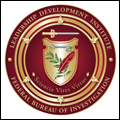LDI
The Leadership Development Institute
| “This place is like the temple where leaders of law enforcement come to receive their mission—don’t ever lose the magic.” |  |
|
|
Assistant U.S. Attorney visiting the FBI Academy for the first time
|
||
The LDI focuses specifically on fostering innovative, applicable, and effective leadership practices and encouraging a spirit of respect and cooperation between and among FBI employees and our law enforcement and intelligence community colleagues worldwide. It provides a range of education, consultation, and networking opportunities to agents, officers, and other professionals at all levels, addressing leadership specifically in the contexts of domestic and international law enforcement, intelligence, and counterterrorism. |
The Leadership Development Institute works through two units, which together provide training and education through more than 35 programs in the U.S. and overseas:
The Community Leadership Development Unit.
This unit provides professional liaison with and executive leadership education to the FBI and its partners; for example, it is one of the largest contributors of instructors and courses to the National Academy.
Among the programs led by or supported by this unit:
- National Executive Institute (NEI)
- Law Enforcement Executive Development Seminar & Regional Command Colleges
- The National Academy
- Leadership in Counterterrorism (LinCT)—Brings together partners from the U.K., the Republic of Ireland, Canada, and the U.S. to study counterterrorism, to discuss and solve terrorism-related issues, and to educate strategic planners with resources to respond to a major incident. A collaborative initiative with the Police Service of Northern Ireland, the Royal Canadian Mounted Police, and the Scottish Police College, this course is enhanced by the participation of Harvard University. An equivalent program was also launched in 2006 for the Pacific Rim and includes law enforcement officials from Canada, Australia, New Zealand, and the United States. These two venues have been essentially merged into one program.
- Domestic Security Executive Academy (DSEA)—Partners senior security executives from the private sector with senior executives of the FBI in a program created by the Bureau’s Criminal Investigative Division.
The FBI Leadership Development Unit.
This unit teaches leadership skills and concepts to Bureau employees—including providing 18 hours of ethical leadership training to new agents and intelligence analysts. This unit also establishes a leadership development vision within the FBI and works to implement that vision through an array of learning opportunities. That vision—called the Leadership Development Strategy—provides a flexible leadership development framework for employees as they progress through their careers.
Among the programs led by or supported by this unit:
- New Agent and Analytical Training—Provides 18 hours of ethical leadership instruction for new agents and intelligence analysts. Includes a tour of the Holocaust Museum in Washington, D.C., culminating in a vibrant discussion of law enforcement values in a democratic society.
- The National Academy
- Navigating Strategic Change—Helps supervisory special agents and senior members of our Intelligence Career Service (intelligence analysts, language specialists, and special surveillance group/lookouts) from FBI Headquarters and field offices to better integrate intelligence and investigative resources in their daily operations. Launched in March 2005, the three-day seminar discusses strategic leadership, communication networks, change implementation, and the role of intelligence in investigations. The course was developed in conjunction with Northwestern University, and classes are held at the Kellogg School of Management in Evanston, Illinois.
- Leading Strategic Change—Launched in October 2003, brings together senior executives, Assistant Special Agents in Charge, and administrative officers for five days to learn about and discuss executive leadership issues such as strategic thinking, decision making, and organizational change. The course was developed in conjunction with Northwestern University, and classes are held at the Kellogg School of Management in Evanston, Illinois.
- Intelligence Community Leadership Development Consortium—Made up of members of the U.S. intelligence community, designs common leadership competencies by management level and curriculum for the National Intelligence University; the Leadership Development Unit is an active and influential member of the consortium.
- Emerging Executive—Prepares upper-level mid-managers for executive level positions in the FBI. The course was developed in conjunction with Northeastern University, and classes are held at its campus in Boston, Massachusetts.
- The Executive Development Institute (EDI)—Teaches leadership concepts to mid- to upper-level FBI employees, both agents and support.
- The Supervisor Development Institute (SDI)—Teaches leadership best practices to agent and support field supervisors throughout the Bureau.
- Excellence in Leadership Seminar (ELS)—Provides a venue for first-line supervisors at FBI Headquarters to further develop and hone their leadership skills and build their capacity to effectively influence people in a dynamic and evolving work environment. The seminar also enables these supervisors to establish new professional relationships through classroom discussions and engagement, breaks and meals, and evening activities. The sessions broadly focus on leadership concepts and best practices, customer service, multi-directional leadership and influence, and workplace interpersonal skills.
- National Defense University—In 2007, set up a full-time FBI Chair to teach in the various programs under the National Defense University umbrella and to serve as the Bureau’s representative to the U.S. military academic community, enabling the sharing of FBI/military best practices and their integration through the federal community.
The instructors.
All faculty members hold or are working towards advanced degrees—including masters, juris doctorates, and PhDs.
For more information:
- The National Executive Institute (NEI)
- Law Enforcement Executive Development Seminar & Regional Command Colleges





